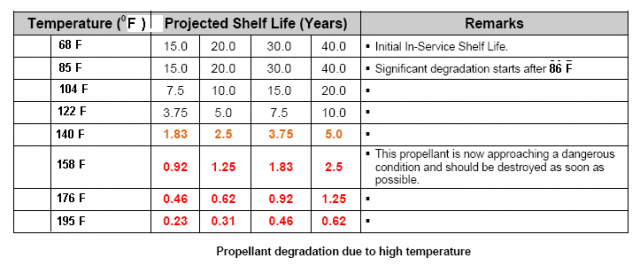You are using an out of date browser. It may not display this or other websites correctly.
You should upgrade or use an alternative browser.
You should upgrade or use an alternative browser.
Moisture?
- Thread starter swampy308
- Start date
Nope. Its the other way around - bringing something cold into a warm house draws condensation.
It can create condensation on the outside, but it does not draw condensation (actually moisture)
Warm air holds more humidity that cold, ergo, in some cases you can draw in air that has higher humidity and causes condensation.
Far more an issue with fluids that expand and contract.
Hot powder, not good for long term storage. http://thefiringline.com/forums/showpost.php?p=6226350&postcount=16
 A closed up car/truck can easly go to 140 F degrees.
A closed up car/truck can easly go to 140 F degrees.

We once measured the temperature in a white car trunk, in the sun, ambient 70 F -- trunk temperature over 150 F !! I say over 150 F since we measured looking at a investment casting wax part - it was slumped down though not fully melted ! 
Keep important stuff insulated even if it's just in a styrofoam container for transportation. Remember that velocity will change too if the ammo is hot !
Heat is bad , condensation more so than moisture , is also bad .
Keep important stuff insulated even if it's just in a styrofoam container for transportation. Remember that velocity will change too if the ammo is hot !
Heat is bad , condensation more so than moisture , is also bad .
While having it in extra hot conditions like a trunk is an issue, the OP asked about a UPS delivery.
I don't believe he had an issue and certainly not with pulling moisture into the can. That is going to take place as soon as he opens it anyway.
Material (powder) is not going to shrink like a fluid and the seal is more than adequate for a normal temperature range (call it 100 degrees)
It is not likely to have been in any extended temps of magnitude long enough to be an issue.
I was a bit startled to see the response that the issue was the other way, basic science says no.
I don't believe he had an issue and certainly not with pulling moisture into the can. That is going to take place as soon as he opens it anyway.
Material (powder) is not going to shrink like a fluid and the seal is more than adequate for a normal temperature range (call it 100 degrees)
It is not likely to have been in any extended temps of magnitude long enough to be an issue.
I was a bit startled to see the response that the issue was the other way, basic science says no.
